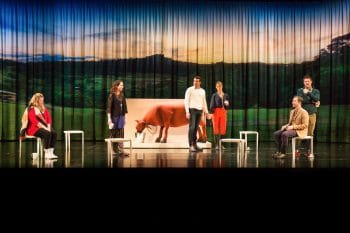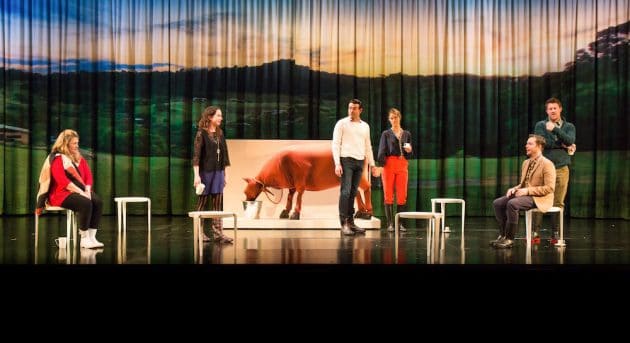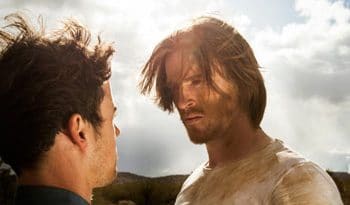The Beast
After surviving a near-fatal fishing trip, three blokes are desperate to change their ways of life. But not too much.

The Beast premiered in 2013, a commission by the Melbourne Theatre Company (MTC) for the Melbourne Festival. Performer, writer and composer Eddie Perfect wrote a black comedy about bourgeois people trying to better themselves by challenging each other, but never really challenging themselves.
As an MTC play, it felt like it was satirising MTC plays. The set-up, the characters and the setting all screamed “concerned with middle-class ennui”, but with fake blood splashed and squirted around the stage. In fact, it isn’t just satirising these tropes, but embracing them to satirise another target: people? White people? White people concerned with sustainability?
Perfect’s first play feels very much like a first play; every set-up is highlighted, every pay-off is telegraphed and every joke is hit at least twice. Sometimes four or five times. After a first act that feels like a cast of joke-generating machines on stage, there are strong moments in the second half. An extended sequence where the pathetic Baird (playwright Perfect, taking centre-stage) pulls the wool over the eyes of the appalling Simon (Peter Houghton) on the subject of wine-tasting is pretty wonderful, so much so the audience burst into applause at the end of the scene. It’s a great ten-minute play inside this two-and-a-half hour beast.
The Beast made me think a lot about the work of Matt Stone and Trey Parker, who created South Park. They are also the co-creators of The Book of Mormon, which opens in Melbourne in 2017. Their work is irreverent and appalling and sharp; the targets of their satire are clear. Sometimes their work seems like a game of characters trying to one-up each other with the most appalling thing they can say, but by the end they’ve told you an interesting tale. You get why they set out to write a Broadway musical or an episode of television or a movie called Team America: World Police.
Perfect’s play isn’t sharp. What is this play getting at? For a while I wondered if all these people worrying about sustainability would realise that their efforts were in vain – or that they were too vain to make an effort. If not a satire on the sustainability movement, is it a satire on factory farming? Is it a satire on men feeling emasculated by modern life (Perfect’s rant about bread and lettuce seems to suggest it)? Or on gender politics in general? The play wants its calf and to eat it, too.
Unlike most first plays, The Beast has a decent budget and a pretty great cast. It’s hard to leave unsatisfied after watching Toby Truslove, Christie Whelan-Browne and Alison Bell do their thing. Truslove and Whelan-Browne’s Rob and Gen bonding over a secret cigarette is a pretty wonderful piece of physical theatre; it’s another tight little scene that tells us more about these broad characters. If the whole play could be as sharp as this and the wine-tasting scene, you might leave the theatre satisfied.
As it is, the cast struggles with a script that is filled to the brim with ideas, but struggles to say anything other than “people are awful, look at people being awful”. Satire should be smarter than characters saying outrageous things at each other; black comedy isn’t just throwing Holocaust, rape and racist jokes at the wall to see what sticks.
What are we left with at the end of the night? The audience laughed a lot and were suitably appalled when the writer wanted them to be appalled. It’s tempting just to remember the good bits: the stuff we laughed at and the bits that were so naughty we giggled like school children.
But I also remember the recurring joke of the male babysitter that is so awfully conceived that the audience stopped laughing. And then it went on so absurdly long that the audience came back to laughter again, because what else do you do when you’re watching a joke being beaten to death on stage? In another sign of “first play”, the corpse of this terrible joke is paraded around at the end of the show – and are we even expected to laugh or just be more appalled? Do you want your audience to leave feeling appalled?
It stuns me that such a mediocre play would get the benefit of a second (touring) production without taking advantage of the biggest benefit of a second production – improving the script itself. And because it’s a touring production, the set design is screen-printed curtains and awkwardly shifted benchtops and dining tables. At least at the MTC, the revered homes of these self-centred characters felt like places they might worship.
I’ve seen The Beast twice now, with the benefit of time off in between for good behaviour. I wish I could tell you this beast was a meal worth sitting down for. Alas, this beast is served raw. And not in a tartare way.





I went and saw The Beast last night and found it interesting, funny and different, then I found it disgusting due to a reference to paedophilia – was that really necessary? I understand the shock value, the underlying message (I think?) and in fact there were references to other subjects that may have offended others and their belief/values (such as animal massacre and abortion) so its a comedy show – but again – to reference paedophilia I believe went too far. I won’t be recommending anyone to see it and support the show.